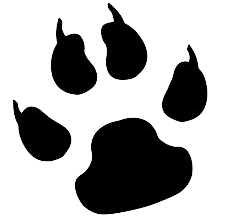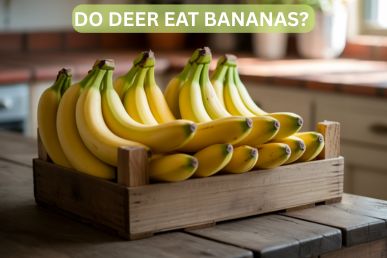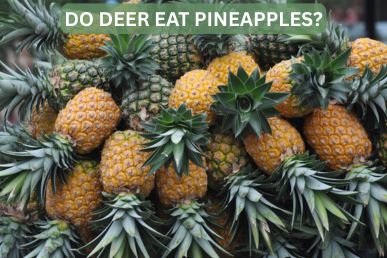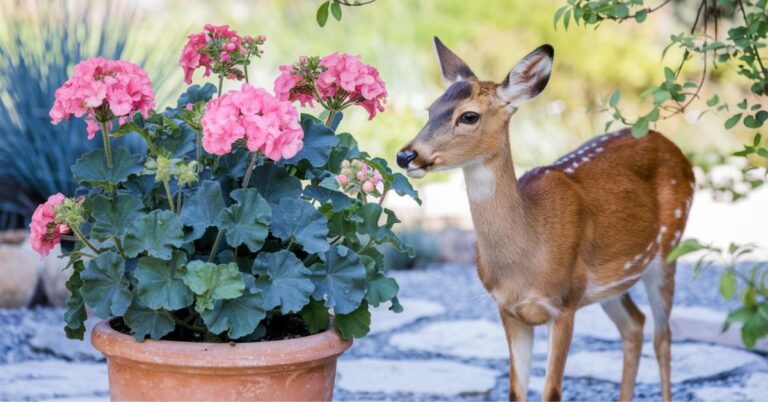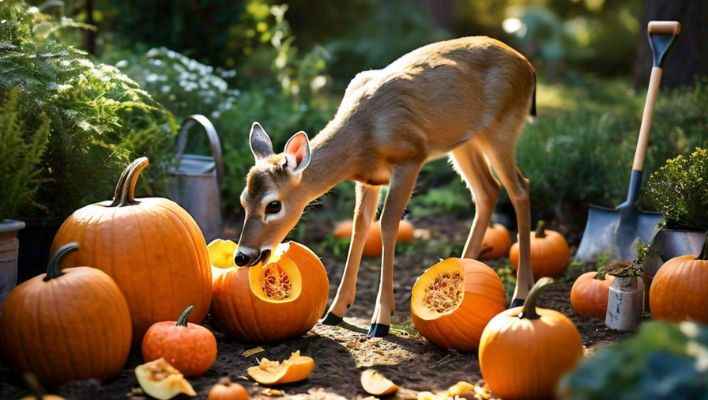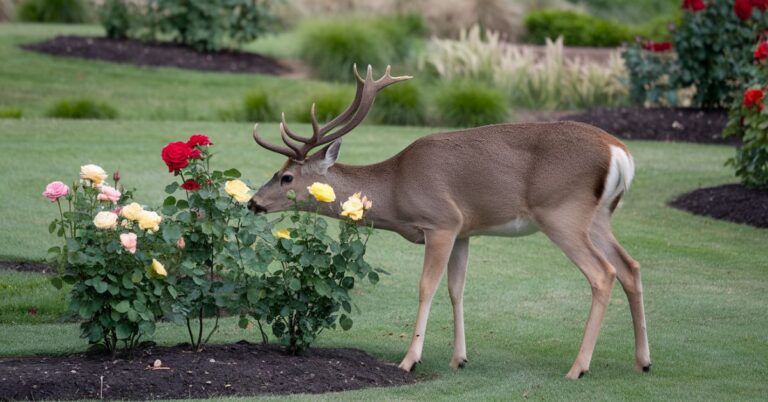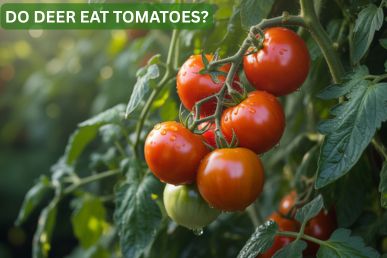Do Deer Eat Potatoes? 4 Proven Ways to Save Your Garden
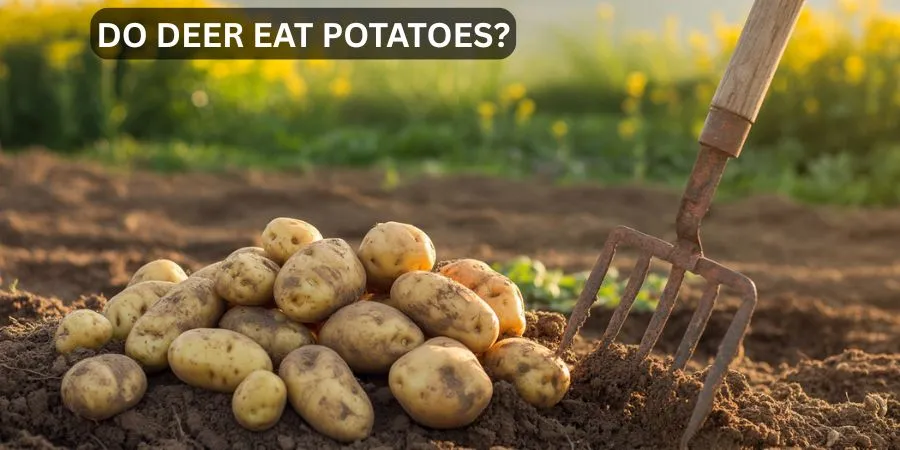
For any gardener, seeing deer as frequent visitors can quickly turn into a nightmare. These graceful creatures love nibbling on tasty plants and vegetables, causing significant damage from deer.
So, do deer eat potatoes? Let’s dive into the interesting relationship between deer and potatoes. While deer might dig up or taste potato plants, especially the leafy greens or exposed tubers, potatoes aren’t their top favorite snack. However, hungry deer will eat them!
This blog shares simple strategies to deter deer and protect your precious garden.
Do Deer Eat Potato Plants?
Okay, let’s talk about potato plants specifically. While deer usually prefer tastier treats, they do eat parts of these plants, especially when they are very hungry and their favorite food sources become scarce.
In such cases, deer may also browse similar vegetables from home gardens, including tomatoes when they’re available.
So, while a deer might nibble on the potato leaves out of curiosity or extreme hunger, it’s not good for them and isn’t common. Interestingly, sweet potato vines are much more attractive and safer for deer to eat.
Do Deer Eat Potato Leaves?
Deer will try many plants when hunger strikes or food is scarce. While they might nibble on young, tender shoots, mature potato leaves are usually avoided. Why?
These leaves contain natural toxic chemicals called glycoalkaloids, making them taste very bitter and spicy to animals like deer. This built-in bitterness and toxicity act as nature’s defense, discouraging grazing.
According to the European Food Safety Authority, when you peel, boil, or fry any food, the amount of glycoalkaloids is reduced. For example:

If hungry enough, deer might eat small amounts, but it’s risky for them. Gardeners can use spraying with safe bitter or spicy solutions on plants to further discourage deer from eating them.
Do Deer Eat Potato Tubers?
While deer certainly eat many plants, potato tubers present a specific situation. These starchy parts grow underground, making them hard for deer to find and access.
Other underground vegetables, like carrots, are also occasionally eaten by deer, especially when food above ground is limited. Generally, deer prefer easier meals like tender leaves and shoots.
However, when their usual food becomes scarce, especially in winter or harsh conditions, hungry deer will dig to reach edible roots and tubers, including potatoes.
Despite the green parts of potato plants having some toxicity, the exposed tubers themselves might be eaten if deer succeed in digging them up during these tough times.
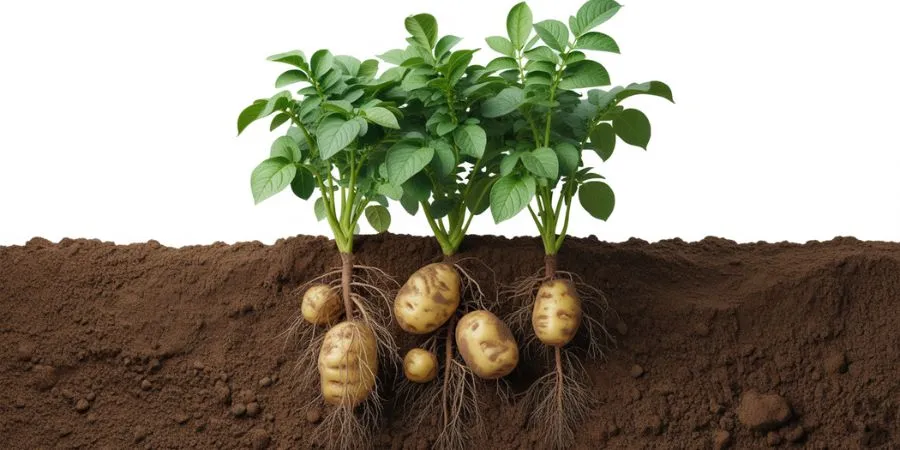
Are Potatoes Deer-Resistant?
Potatoes are root vegetables with edible tubers that grow underground, making them tricky for deer to access.
While deer enjoy grazing on tender greens, they usually avoid potato foliage and leaves because these contain glycoalkaloids—natural chemicals that taste bitter and are toxic to many animals.
This bitterness acts like a built-in deterrent, turning potato tops into an unappetizing snack. So, under normal conditions, deer prefer tastier meals like beet greens, radish tops, or sweet potato vines over potato plants.
Other seasonal favorites like pumpkins are also more likely to be targeted by deer due to their soft texture and sweet smell.
However, no vegetable is completely deer-proof! If hunger strikes and food becomes scarce (like in winter), deer might override their usual preferences and readily eat certain parts of potato plants they’d normally skip—including the leaves.
The tubers themselves are safer since deer rarely dig up underground crops. But if you’ve just harvested and left potatoes exposed, their strong appetite could lead them to feast on your spuds.
While toxicity helps potatoes escape being a deer buffet most times, desperate animals might still take a bite if they grow desperate enough.
Can Potatoes Repel Deer Naturally?
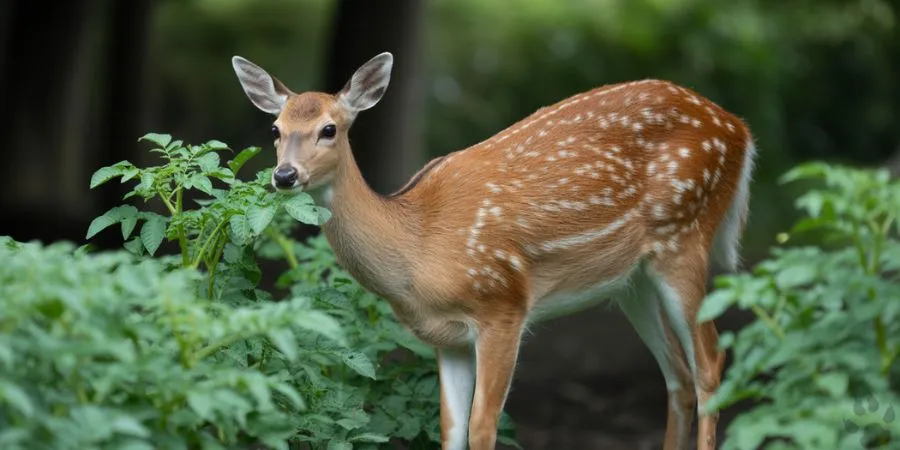
Do potatoes deter deer? Not exactly! While deer might dislike digging for tubers, they are opportunistic eaters. If young shoots or leaves are easy to reach near wildlife plots or feeders, they might eat them.
Buried potatoes are often unavailable, but above-ground parts aren’t reliably avoided. Some aspects (like toxic greens) aren’t always a strong deterrent, especially if other food is scarce.
Farmers planted potatoes intentionally, but don’t rely on them to repel deer. Yep, I’ve seen it myself! They’ll browse greens if hungry enough, making spuds a poor long-term deterrent source.
Where Are Deer Most Likely to Eat Potatoes?
Deer live near farm plots and orchards where potato crops grow. In spring, summer, and fall, when their natural food sources run short, deer populations might eat potatoes. They’ll even visit your garden!
This happens during hungry times when deer need extra food to fulfill their hunger, munching on plants like potatoes in these areas.
How to Protect Potatoes from Deer?
Since you cannot prevent deer from entering your garden by using potatoes, you need to take some precautionary measures in this situation. Some strategies are as follows:
1. Install Physical Barriers
Got a smaller spot for your potato gardens? Try a shorter fence wrapped in deer netting around those young potato plants.
This netting-reinforced barrier helps prevent early munching damage and can deter casual grazers, though it’s not foolproof against super hungry deer!
For bigger plots, go sturdy:
- Enclosing your whole potato patch with an 8-foot-tall fence works best.
- This tall fencing is way more effective in keeping deer out completely.
For small gardens, lightweight deer netting kits like this one on Amazon offer a budget-friendly way to keep deer from nibbling your greens. Check price on Amazon
2. Use Deer Repellents
If you’re protecting your potatoes from hungry deer, try using special products called repellents. These come in two main types: odor-based and taste-based.
- Odor-based ones release strong smells that mimic predators (like wolves) or rotting decay to scare deer away.
- Taste-based solutions make plants taste bitter or spicy, which discourages eating. Just spraying these on potato leaves and shoots can help keep deer from snacking!
You’ll find repellents in granular or liquid spray options, with different sizes for easy use. For lower-level plants like potato bushes, granular deer repellent is often the best option—it’s simple to sprinkle around the soil.
This deer repellent works well for leafy plants like potatoes. 👉 View on Amazon here
To prevent deer from adapting to one type, rotate your repellents regularly. Remember: if you apply them to edible crops, always wash potatoes before consuming them to avoid any yucky residue!
3. Introduce Deterrents
Got deer eyeing your potato patch? Try using dogs! A dog’s loud bark and presence can really scare deer away. Just remember to always supervise these interactions. You never want a deer to feel cornered or aggressive, as that could be dangerous for everyone.
Deer are super active during nighttime hours when you’re probably sleeping, so a dog patrolling can be a big help.
Another cool trick? Motion-activated sprinklers. These clever devices sense when a deer is approaching your garden. Then—whoosh!—they give a sudden, surprising burst of water. This startle effect is great for deterring them without harm.
This motion sprinkler scares deer off without harm. 👉 Check price on Amazon
4. Diversify Deterrent Methods
Combining multiple strategies works best against deer munching on potatoes! Relying on just one thing rarely lasts. Think of it like building a strong, layered defense:
- Use smelly repellents.
- Install sturdy fencing.
- Add other deterrents like motion sprinklers.
This layered approach keeps deer guessing and protects your spuds better than any single method ever could. From my gardening days, tricky deer quickly learn to ignore just one trick!
Other Deer-Resistant Vegetables

Final Thoughts: Do Deer Eat Potatoes?
So, will deer eat your precious potatoes? Absolutely, under the right conditions. While regular potato leaves can be mildly toxic, deer might still nibble on them, especially the tender young shoots.
The real prize for them, however, is the tubers—your actual potatoes! Deer will happily dig them up, particularly when they are desperate for food, like in late winter or during droughts.
Sweet potatoes are also a favorite target for these hungry visitors. Don’t despair! You can protect your garden and safeguard your plants. Effective deterrents and measures are key.
Consider strong physical barriers like tall fences made of sturdy wire or netting buried underground to stop digging. Deploy repellents around your garden; remember to rotate different types occasionally to confuse the deer and keep them effective.
Motion-activated sprinklers can startle and repel them effectively. Using a combination of these strategies will significantly reduce damage, letting you enjoy seeing your protected plants thriving. All these methods are included in a good defense plan.
Frequently Asked Questions:
Do deer eat potato peels?
Potato peels contain a toxic compound called solanine, which can be harmful to deer, especially if consumed in large quantities. This natural toxin protects the potato plant but can make deer sick. So, while a deer might eat a peel by accident, deliberately feeding them peelings is risky because of this toxic substance. Stick to what grows wild for them!
Will wild deer eat raw potatoes?
Technically, wild deer might eat raw potatoes since they’re edible. But it’s not recommended! Compared to cooked potatoes, raw ones have significantly worse taste and texture. Also, digesting raw potatoes can be a difficult task for deer. Eating them could cause harm, even in small amounts.
